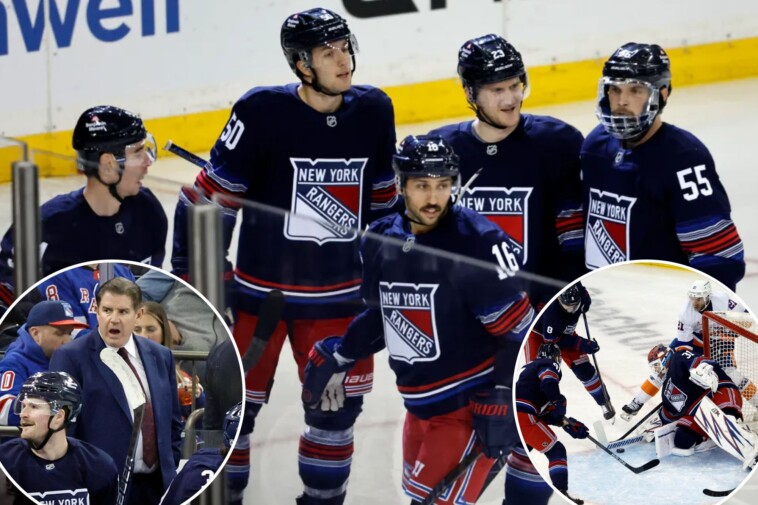You couldn’t say that the Rangers had grown moldy, not while going 7-2-1 in their first 10 games, even if relying on their elite goaltending tandem of Igor Shesterkin and Jonathan Quick way too much.
But even while posting victories as if borne by muscle memory, the dynamic seemed to have grown stale. The top-six forward combinations that had been in place for nearly all of Peter Laviolette’s tenure behind the bench had become stagnant.
That’s one of the consequences of running it back with a nucleus that, for the most part, has been in place going on six seasons.
So the coach shook it up for Sunday afternoon’s Garden match against the depleted, talent-compromised Islanders and the Blueshirts rolled to a 5-2 empty-net aided victory that wasn’t quite worthy of a standing ovation but was significantly better than the club’s brand of hockey over the last couple of weeks.
For the new combinations in which Mika Zibanejad — and not Vincent Trocheck — centered Artemi Panarin and Alexis Lafreniere, and in which Chris Kreider skated with Filip Chytil — not Zibanejad — and Kaapo Kakko while Trocheck skated with Will Cuylle and Reilly Smith, caught everyone’s attention.
There was better detail and much more aggressive puck pursuit. There were fewer turnovers. There was a concentrated slot drive to the net. The changes in forward combinations were accompanied by going back to the Ryan Lindgren-Adam Fox, K’Andre Miller-Jacob Trouba defense tandems that have been in place for the last four seasons.
The Rangers did not cede the middle of the ice or the defensive line quite so easily. There were fewer off-man rushes with which to contend, even if Shesterkin was called upon to make one breakaway save on Bo Horvat ahead of another two-on-oh magical stop on Horvat again.
“I thought it was way better,” Laviolette said. “Goaltenders are going to have to make big saves, both teams, that happens every night, and yeah, he was good but not like three of the last four games where it felt like it was kind of one-sided.
“I felt like we were punching and punching and we’re going to get punched once in a while, too. But overall I thought it was a much better performance both defensively and on offense.”
Zibanejad and Kreider had played every game as a matched set of utensils since Laviolette took over last season, 91 straight in the regular season (the Swedish center missed one match last season) and 16 in the playoffs.
From 2016-17, when Zibanejad arrived from Ottawa in exchange for Derrick Brassard, through last season, he and Kreider had been on for 4,749:36 at five-on-five. They had been on for 234 Rangers goals and 182 against for a 56.25 percentage. Over the previous two seasons, they’d been on for 163 for and 119 against, 57.8 percent.
But this season, they’d been on for three goals for and five against in 100:13 and neither was playing particularly well. So Laviolette shook it up. He didn’t quite throw numbers into a hat before picking them out, but he put the top nine into a blender out of which came a message, even if subliminal.
The message, as I infer, is that same old, same old was getting old.
“Those messages get delivered [regardless] of whether the lines have changed,” Laviolette said, suppressing a chuckle. “They’re there the next day, they’re there after games. It’s a pretty honest locker room.
“I do think that when you come in and shake it up, you’re going down one way. I’ve been pretty consistent for 90 games. Now you come in and mix it up, but there were meetings where it was communicated that this is not the way we want to play.
“I do think there’s a combination,” said the coach. “Yeah, there was a shake-up. Yes, we addressed some things.”
Zibanejad picked up three assists, one on Kreider’s shorthanded goal off a two-on-one rush that was a thing of beauty, with one on Panarin’s power-play goal and the third on No. 10’s empty-netter. Zibanejad was assertive with and without the puck in working with his new linemates, but he had also picked up his game Friday against Ottawa after a particularly inferior outing in D.C. on Tuesday.
“Probably, but at the same time, I can look at it where we had a record of 7-2-1 and think we can play better. I would say that’s a good problem to have,” No. 93 said when asked if the coach had sent a message in a bottle containing the line changes.
“And we do it, come out and play one of our most solid games of the season, it shows what kind of team we have.”
A team that is 8-2-1 and can be better.







